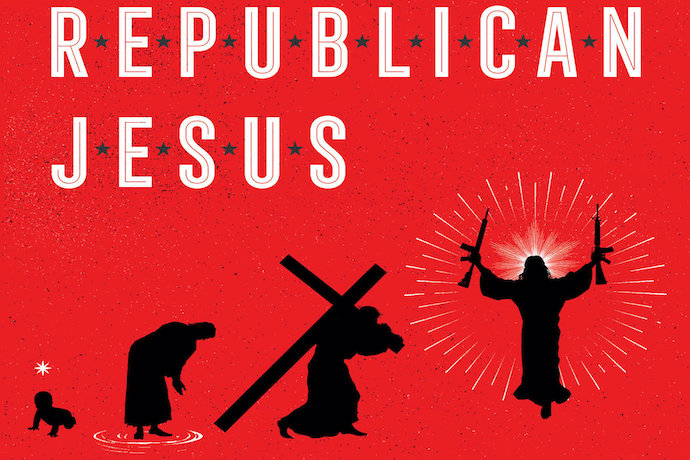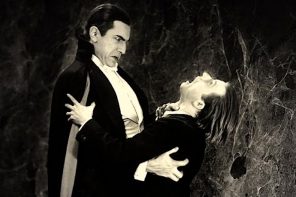The following is an excerpt from Republican Jesus: How the Right Has Rewritten the Gospels (The University of California Press, 2020). Read Peter Laarman’s review of the book here.
One of the key biblical texts that Republican Christians have tethered to their “family values” agenda is Matthew 19:3–6. In this passage, Jesus quotes from Genesis in the course of his teachings on marriage and divorce: “[God] made them male and female.” For many conservative Christians, this verse shows that Jesus deemed gender biological and binary and that he sanctioned only heterosexual marriages as legitimate. Republican influencers’ interpretations of this verse undergird Christian transphobia and homophobia ranging from Jerry Falwell’s berating of the “effeminate” purple Teletubby, Tinky Winky, to extremist pastors’ public praise of the actions of the radical Islamic fundamentalist who slaughtered forty-nine people at a gay nightclub in Orlando in 2016.
Many conservative Christians have believed that liberals’ campaigns for sexual rights would bring about God’s wrath. AIDS “may be a judgment of God on the nation,” Billy Graham proclaimed as gay men and other marginalized persons fought for their lives during the AIDS epidemic in the late 1980s. Jerry Falwell concurred and added that homosexuality was “Satan’s diabolical attack against the family.” For Tim LaHaye, the coauthor of the best-selling Left Behind series and author of a similarly apocalyptic book called The Unhappy Gays, homosexuality had been the cause of the Flood and the Babylonian captivity and remained “part of the buildup of the ‘perilously evil times’ that are prophesied for the last days.”
The apocalyptic urgency of conservatives’ political agenda against equal rights for LGBTQ+ people has experienced a resurgence in the benighted epoch of Trump. Vice President Pence has echoed the Evangelical influencers by prophesying that same-sex couples will be the cause of “societal collapse.” And while Trump claims to be good for the gay community, his administration has sought to diminish nondiscrimination protections for LGBTQ+—and especially for transgender—people in employment, health care, and military service.
Conservatives are right that the passage in Matthew depicts marriage as being between a man and a woman. This is not surprising, for the Pharisees specifically asked Jesus about a law pertaining to marriage between a man and a woman, and, besides, there were no same-sex marriages in the New Testament world. Mark and Matthew present Jesus’s teaching as a narrowly defined discussion pertaining to the interpretation of a law in Deuteronomy. The texts don’t reject gay marriage; they don’t even address it.
Matthew’s Jesus does, however, recognize nonbinary gender in the grand finale of his teaching on divorce in a verse that conservatives routinely omit. After learning of his strict position on divorce, Jesus’s disciples ask him, “Is it better not to marry?” (Matt 19:10). Jesus answers, “For there are eunuchs who were born that way from their mother’s womb, and there are eunuchs who have been made eunuchs by others, and there are eunuchs who had made themselves eunuchs for the sake of the kingdom of heaven. Let anyone accept this who can” (19:12).
In the course of his teaching about marriage, Matthew’s Jesus thus recognizes the existence of three types of sexual minorities—those born eunuchs, those who were castrated, and those who voluntarily became eunuchs for the Kingdom of Heaven. The first group—eunuchs who were born that way—is particularly interesting, for Jesus uses the phrase “from their mother’s womb” to describe them. Eunuchs from the womb could refer to men born with one or two undescended testicles (cryptorchidism) or with some other genital-related physical or sexual condition that the ancients perceived as a defect. Like slaves who were castrated so that they could serve in political administration without the ability to pass their office on to their progeny, eunuchs from birth were widely derided as incomplete and unmanly men.
Matthew’s Jesus, however, recognizes—shortly after speaking of those “made male and female”—that some people are born as neither women nor fully men. According to the Mishnah, Jewish rabbis in the first century CE also recognized the existence of natural eunuchs (“eunuchs of the sun”) as distinct from eunuchs castrated by humans (“eunuchs of man”). The rabbis specifically debated the legal capabilities of eunuchs in relation to marriage and procreation, just like Matthew’s Jesus. Rabbi Akiva, for instance, reasoned that eunuchs could not perform the rite of levirate marriage—a brother’s duty to marry the wife of a brother who dies—because they could not procreate, but Rabbi Eliezer retorted that natural eunuchs might be able to procreate and therefore fulfill this commandment. Both of these rabbis upheld the significance of marriage and did so because they viewed the purpose of marriage as procreation.
Matthew’s Jesus was not as quick to encourage marriage and thus used the example of the eunuch to stake a different position in the rabbinic debate about marriage and procreation. Unlike the rabbis, he forecast the imminent end of the world and therefore idealized eunuchs precisely because they often did not marry. As a response to his disciples’ question about whether to marry, Jesus’s proclamation about eunuchs implies that celibacy is the ideal state in which humans should await the Kingdom of Heaven. Jesus’s enjoinder to “let anyone accept this who can” mirrors the apostle Paul’s preference for celibacy with a special allowance for those who don’t have enough self-control to be celibate: “To the unmarried and the widows I say that it is well for them to remain unmarried as I am. But if they are not practicing self-control, they should marry. For it is better to marry than to be aflame with passion.”
Jesus in Matthew calls on his followers not to self-castrate but instead to be celibate. Eunuchs here function as an example of the unmarried. Like Paul’s letters, Matthew’s gospel presents celibacy as an ideal in part because it requires renouncing conventional gender roles. For the earliest Christians, celibacy anticipated the androgynous, or at least sexually ambivalent, state that their resurrected bodies would take in the Kingdom of Heaven. Resurrected bodies will be neither male nor female: “For in the resurrection they neither marry [male] nor are given in marriage [female], but are like angels in heaven” (Matt. 22:30). Apparently, there are no men’s and women’s restrooms in heaven.
The earliest Christians believed that androgyny—a mixture of male and female characteristics—was the perfect, primal form of humans to which they would return in the afterlife. Through the ritual of baptism, they symbolically assumed nonbinary gender by clothing themselves with Christ so that “there is no longer male and female” (Gal. 3:28).
Ancient understandings of androgyny assumed an interdependence of the sexes but by no means an equality of the sexes. Christians sought out the unification of male and female during their earthly lives, but this unification almost always favored male characteristics because female bodies were thought to be imperfect. As Jesus says in the Gospel of Thomas, a very early gospel that many ancient Christians deemed authoritative, “Look, I shall lead her so that I will make her male in order that she also may become a living spirit, resembling you males. For every woman who makes herself male will enter the kingdom of heaven.”
Celibacy, according to New Testament texts, was a way for the baptized to experience during their remaining time on earth the relinquishment of conventional gender roles that would be their reward in heaven. In this sense, celibacy was construed as androgyny with regard to gender identity and expression (being clothed with Christ means expressing as neither male nor female). But through the example of the eunuch, Matthew’s Jesus also relates celibacy to androgyny in terms of biological sex: eunuchs’ bodies are physically different from those of men, as defined in this ancient context.
Franklin Graham and other conservative leaders preach that “you can’t get any clearer” about traditional marriage and binary gender than their narrow-sighted interpretation of Matthew 19:4. It turns out that their interpretation of the verse is about as self-evident as the gender of resurrected bodies.





